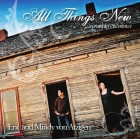 …with liberty and justice for all.
…with liberty and justice for all.
Liberty and Justice are two of the most noble concepts a person could ever hope to wrap their mind around. They are everything our immigrant grandparents came to the United States for, they are everything our forefathers fought for, and they are all we have ever known.
Each of us has faced our own set of challenges, obstacles, and prejudices in life, but most of take for granted the amazing grace of living in a society that values liberty and justice.
The book of Nehemiah tells a beautiful story of what can happen when a community sets their hearts to build together, but there is another building story tucked inside of this book. Right in the middle of this amazing story about rebuilding a wall around Jerusalem is a story about a different kind of rebuilding, the rebuilding of the people who will be protected by those walls.
Nehemiah 5:1-19 (NIV)
Now the men and their wives raised a great outcry against their Jewish brothers. 2 Some were saying, “We and our sons and daughters are numerous; in order for us to eat and stay alive, we must get grain.”
3 Others were saying, “We are mortgaging our fields, our vineyards and our homes to get grain during the famine.”
4 Still others were saying, “We have had to borrow money to pay the king’s tax on our fields and vineyards. 5 Although we are of the same flesh and blood as our countrymen and though our sons are as good as theirs, yet we have to subject our sons and daughters to slavery. Some of our daughters have already been enslaved, but we are powerless, because our fields and our vineyards belong to others.”
6 When I heard their outcry and these charges, I was very angry. 7 I pondered them in my mind and then accused the nobles and officials. I told them, “You are exacting usury from your own countrymen!” So I called together a large meeting to deal with them 8 and said: “As far as possible, we have bought back our Jewish brothers who were sold to the Gentiles. Now you are selling your brothers, only for them to be sold back to us!” They kept quiet, because they could find nothing to say.
9 So I continued, “What you are doing is not right. Shouldn’t you walk in the fear of our God to avoid the reproach of our Gentile enemies? 10 I and my brothers and my men are also lending the people money and grain. But let the exacting of usury stop! 11 Give back to them immediately their fields, vineyards, olive groves and houses, and also the usury you are charging them—the hundredth part of the money, grain, new wine and oil.”
12 “We will give it back,” they said. “And we will not demand anything more from them. We will do as you say.” Then I summoned the priests and made the nobles and officials take an oath to do what they had promised. 13 I also shook out the folds of my robe and said, “In this way may God shake out of his house and possessions every man who does not keep this promise. So may such a man be shaken out and emptied!”
At this the whole assembly said, “Amen,” and praised the Lord. And the people did as they had promised.
What we see here is a cry for justice. The citizens of Jerusalem are saying, “What is the point in rebuilding a wall if we are still slaves behind its protection?”
This story of rebuilding a wall is particularly relevant to the current social revolution of the “Occupy Wall Street” movement.
To be honest , I don’t really get Occupy Wall Street. As near as I can tell, it is an expression of frustration against corporate greed and lack of accountability in our financial sector. And at that level I can relate to the frustration.
But the entire movement, from the beginning, has lacked a clear voice, and so, at times, it comes across as a whine for socialism, or an expression of jealous greed. It has even manifested itself in racism toward Jews and a push for complete anarchy.
The confusion of the Occupy Wall Street movement comes from the fact that it doesn’t seem to know what it wants; it just knows it doesn’t want what it has, and, at that level, it ends up sounding like a spoiled child.
What we see in Nehemiah chapter 5 is similar to how people feel who are part of Occupy Wall Street, except that the frustrations expressed by the Jews in that day were extreme and most obviously legitimate.
Nehemiah 5:4-5 (NIV)
4 Still others were saying, “We have had to borrow money to pay the king’s tax on our fields and vineyards. 5 Although we are of the same flesh and blood as our countrymen and though our sons are as good as theirs, yet we have to subject our sons and daughters to slavery. Some of our daughters have already been enslaved, but we are powerless, because our fields and our vineyards belong to others.”
And look at Nehemiah’s response.
Nehemiah 5:6-7 (NIV)
6 When I heard their outcry and these charges, I was very angry. 7 I pondered them in my mind and then accused the nobles and officials. I told them, “You are exacting usury from your own countrymen!” So I called together a large meeting to deal with them…
Here is the key: Injustice should make us angry, and it should lead us to action.
As I have read about the Occupy Wall Street movement , one of their hallmarks are the slogans they put on their protest signs. These guys are professional sign makers.
I want to point out three signs that I call: Wrong, Right, and Radical. And I want you to consider how these three ways of thinking are impacting your life.
Look at this sign:
 WRONG!
WRONG!
“We are the 99%” is one of the huge battle cries of the Occupy Wall Street movement. It is a claim that the problems in America should be blamed on 1% of the population who are greedy and keeping the rest of us in poverty.
The first major problem with this claim is that it is simply wrong.
At the bottom of the sign, it says, “Look it up.” And when you do look it up, you begin to discover how overwhelmingly wealthy we are as Americans. In the United States, the poverty line is approximately $22,350. If your household makes less than this, you are considered in poverty conditions in our country.
But do you know where that places you in the world?
According to the Global Rich List, an annual income of $22,350 puts you among the top 10% of the wealthiest people in the world. And check this out. A combined household income of $50,000 would make your family among the top 1% of the wealthiest people in the world.
And check this out. A combined household income of $50,000 would make your family among the top 1% of the wealthiest people in the world.
So back to our 1% boy…
Do you see his shoes? Do you see his pants? Do you see his clean finger nails? This average American boy is among the top 1% of the wealthiest people in the world.
What is wrong about his sign is that he is using it to say, “The problems I am facing are someone else’s to fix.” As long as any of us are looking for someone else to fix our problems, we will stay in a mindset of poverty.
No one is holding you down. No one is holding you back from being who God has created you to be. But, if you are waiting for a handout to get there, you just became your own worst enemy.
Here is the next sign.
 Ouch, that one hurts my feelings. But this sign is RIGHT.
Ouch, that one hurts my feelings. But this sign is RIGHT.
Now, I do not believe America has failed as a society, but we have been damaged as a society. And this sign is right because of the words, “So-Called.” Anytime someone hides behind the label of Christianity and uses that label as an excuse for greed, selfishness, or hatred, they are wounding their society and they are making a mockery of the teachings of Jesus.
It may not be a secret that you attend church on a Sunday morning, but what does your version of Christianity say in the workplace? In the handling of your finances? In your home? In private?
A half lived faith does a whole lotta damage to our world.
Let’s take a look at one more sign.
 “The only way to deal with an unfree world is to become so absolutely free that your very existence is an act of rebellion.”
“The only way to deal with an unfree world is to become so absolutely free that your very existence is an act of rebellion.”
This is a quote from Albert Camus, a 20th century novelist and philosopher. And that, my friends, is the definition of radical. It is one of the most beautiful sentences I have ever read. And, in the Occupy Movement, it is being used in exactly the wrong way. What a heartbreak!
The Apostle Paul says it this way:
Romans 12:2 (NIV)
2 Do not conform any longer to the pattern of this world, but be transformed by the renewing of your mind. Then you will be able to test and approve what God’s will is—his good, pleasing and perfect will.
If you want to see justice in our land, begin by taking responsibility for your actions by doing these three things:
- Confront the wrong ways of thinking in your heart. Filter them through the truth of God’s word.
- Accept what is right. Allow yourself to be challenged by hard truths.
- Live radically.
If we would apply ourselves to these truths, I believe we would see true justice and liberty flow like a river through our land, and we would most certainly become ONE NATION UNDER GOD.
Read Full Post »
 Words have power, and thoughts, like seeds, can take root in the heart to alter our perspective or change our behavior altogether. The following is a list of quotes etched in my memory, and a brief explanation of their significance.
Words have power, and thoughts, like seeds, can take root in the heart to alter our perspective or change our behavior altogether. The following is a list of quotes etched in my memory, and a brief explanation of their significance. 


















